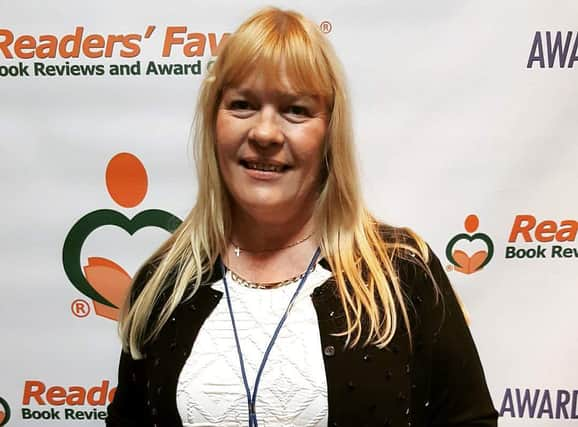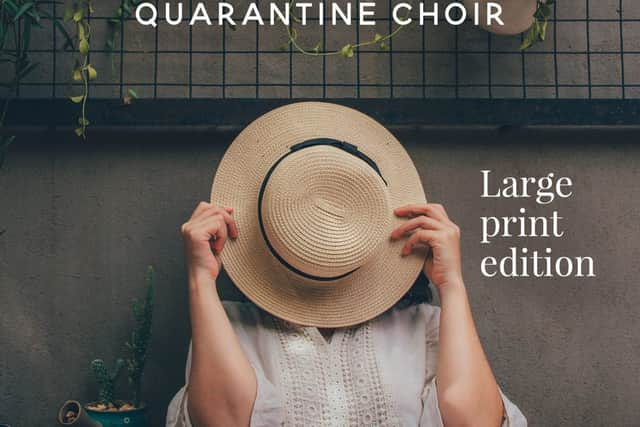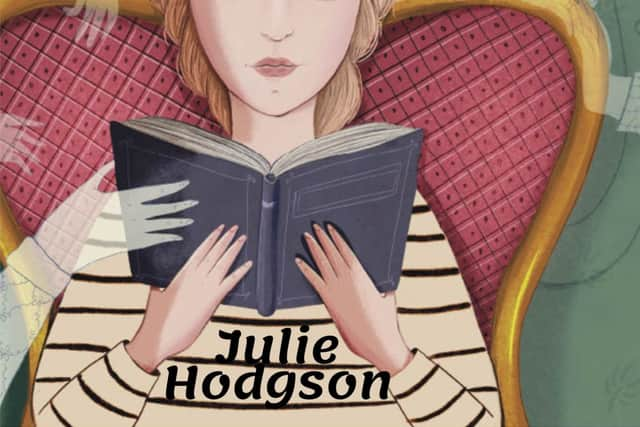Must-read of the week: Carry on singing: Quarantine Choir
This article contains affiliate links. We may earn a small commission on items purchased through this article, but that does not affect our editorial judgement.


Carry On Singing by multi award-winning author Julie Hodgson is a lockdown-inspired novel with a difference. Beautiful and uplifting, it celebrates camaraderie and the healing power of music in pitch-perfect form.
By Gwyneth Rees


When the Covid pandemic emerged early last year it caught the world by surprise. Suddenly, all the freedoms we had taken for granted were being revoked as we came to learn a new word that would come to dominate conversations going forward: ‘lockdown’.
Multi award-winning author Julie Hodgson was, like most people, left in the position of being essentially house-bound with little to occupy her time.
To distract her mind from the doom and gloom being reported in the news, and to keep her sanity, she found a new social outlet online: virtual choirs. Her new novel, Carry On Singing: Quarantine Choir, is inspired by those experiences.
And what a heart-warming, funny and touching novel it is. The pandemic will have certainly left imprint in the future creative outpourings of authors, but I reckon you would be hard-pressed to find a lockdown-inspired story as positive and life-affirming as this.
The story follows Rosie, a Scottish woman in her forties who is facing something of a mid-life crisis.
Her musician husband, Sal—the love of her life—has become bored of Rosie, and by what they have become. So, to give them both some space in the hope of reconciliation, she decided to temporarily relocate to Ponte de Sor in Portugal.
She joins a local choir only for Covid to strike. Rather than enjoying the fresh air and sunshine of this continental getaway, she finds herself stuck in her apartment, being forced to turn what was only meant to be a temporary existence into something more permanent.
It is at this point that the reader begins to understand just how Rosie’s life has unravelled.
She once had dreams, to be a travel writer and explore exotic places. Now, she writes commercial copy about textiles and lives vicariously through her 18-year-old daughter, Frida, who is enjoying love, sun and adventure while locked down in Australia.
Rosie, however, finds that lockdown heightens her loneliness. She eats too much cake, avoids her neighbours, and likes staring out of her bedroom window making up stories about strangers.
Her world becomes limited to Zoom and attempts to dye her hair, buy underwear, and go on a virtual date only bring fleeting comfort.
Desperate for company, she eventually commits to online rehearsals with the choir and this is where the story really begins, as the choir settles into a new weekly routine.
Of course Rosie enjoys the music and the break from the mundanity of lockdown life, but she quickly discovers that the choir brings something else with it: solid female friendships that she never experienced, or thought she needed, during her marriage.
The choristers include a gang of memorable and colourful personalities, including Gita—a “buttoned-up character with a straight spine and small mouth”, sex-mad Sofia, Carolina and her many phobias, and Leonor, who like Rosie is also suffering from heartbreak.
Personally, it is the interactions between these women that I found to be among the most enjoyable aspects of the book.
This scene, in particular, seems to encapsulate the very essence of the story, where Gita jumps on Rosie, sensing all is not well:
“What Sofia means is,” Gita cut in again, “is that we’re here for you. Whatever’s going on for you, you can talk to us. I know we haven’t known each other long, but you can lean on us. We always stand by each other in this choir, and you are one of us now.”
That is what Carry On Singing is fundamentally about: finding support through friends, and standing by each other.
Another lovely scene is when Rosie finally admits, to Leonor, that something is wrong:
“I’m sorry, Leonor. I haven’t been sleeping too well. I must look a wreck. I’m fine, really. Everything’s just a bit strange at the moment.”
Leonor smiled. “Wow, you almost actually admitted you were struggling then, Rosie.”
It is shrewd-eyed Leonor, too, who notices how Rosie seems so “full of joy” when she sings—more so than anyone else in the choir.
And not to give too much away, it is this untampered enthusiasm which leads Rosie to being picked to perform a solo in an upcoming performance.
It’s a big task and comes with a bundle of nerves for Rosie to unpack. Can she do it? What will it mean for her “boring” life if she does?
Whatever the outcome of the performance, it’s clear that the transformative power of music and friendship will have a profound and lasting effect on Rosie, forcing her to reassess her relationship with Sal and, indeed, her life.
Carry On Singing is one of those reads that is difficult to put down or not inhale in one satisfying, easy go. It has an uplifting and compelling narrative supported by characters that you soon come to love.


This is, no doubt, thanks in part to the author’s own insider knowledge of gospel choirs and renewed appreciation of the personal wellbeing that such social activities—be they in person or virtual—deliver.
It’s also partly because Julie is a seasoned writer, who marks her 25th published book with this novel.
And, finally, it’s because Julie, herself, lives in Portugal, in Aviz, within the region of Portalegre to the east of the country.
The particulars of Rosie’s story are all fiction but that exuberance for choirs, for singing, and the laid-back lifestyle that only the Mediterranean can provide are all straight from the author’s heart.
Indeed, the story is so warming that it’s as Julie’s been able to trap some of the glorious Portuguese sunshine within its pages.
The novel, with proceeds from sales benefitting Portuguese community charity Acas, is ostensibly aimed at the young adult market but, truth be told, it will be enjoyed by all ages.
Fittingly, she has dedicated Carry On Singing to her own choir, Coro Gospel Ponte De Sor, and “all the choir members and musicians out there in the world”.
It’s a worthy tribute. Carry On Singing has a delicious melodic flavour that will soon have your soul singing in delight.
Carry on Singing: Quarantine Choir by Julie Hodgson is out now, published through Chave AB and available in paperback and eBook formats, priced £12.82 and £2.99 respectively. It is available on Amazon and via Books2read.com Visit www.juliehodgson.com
MEET THE AUTHOR: JULIE HODGSON
Julie Hodgson, 59, is both a prolific, award-winning author, having published more than 25 books for young adults and adults, and traveller, having lived around the world. Here we learn more about her writing journey to date and the influences that have shaped her work, which touches on many emotions but always with the added fizz of warmth and humour.
In many ways, the life of author Julie Hodgson mirrors that of her recent fictional protagonist Rosie, who appears in new novel Carry On Singing: Quarantine Choir.
As the feel-good story unfolds, Rosie discovers the key to a happy life is travel, camaraderie, family and singing. And so it seems to be the case for Julie herself.
Born in Burton Upon Trent in 1962, she was a premature baby. She would spend the first six months of her life in hospital and was named ‘Julie’ by her midwife, who described her as like a “tiny jewel”.
Aged 10, and already a keen writer of poetry and short stories, she moved with her family to Mablethorpe, Lincolnshire. There, her parents worked at a local holiday park, packed with entertainment and stars of the day.
It was seeing these performers on stage, and taking part in the frequent talent competitions, that first drew Julie towards the world of singing.
But it was another early love—travel—that was to occupy her once she became an adult.
After leaving school, Julie moved first to Germany, where she learned the language while working as a nanny.
Then, she followed her boyfriend (and soon-to-be husband) John to Malaysia, where he had a job with Shell.
The couple welcomed a daughter, Sarah, born in 1984, and moved to Malta, while John worked for Swedish company ASEA outside of Tripoli , Libya—forty minutes away by plane.
In 1985 Julie relocated to Libya to be closer to her husband, living in an ASEA camp, and it was here that she first became focussed on her writing.
She became aware that local children were keen to learn English but had little access to material. At this time Colonel Gaddafi ruled the country with an iron fist and English books were strictly forbidden.
Julie took it upon herself to teach kids in secret. Bringing the children together under the pretence of being playmates for her young daughter, she wrote stories for them as well as smuggling in Ladybird books to teach them to read.
That same year, America jets bombed Libya and for several days Julie had no way of knowing if her husband was alive. Thankfully, he had been in the desert at the time and was uninjured. Julie, meanwhile, had protected herself by burying containers into the ground to serve as a makeshift bomb shelter.
In 1987, Julie had another close shave when she was involved in a plane crash while 37 weeks’ pregnant with her second child, Tristan. On transit from Libya to Manchester, her plane’s engines failed and it quickly diverted to Malta, where it landed safely in foam. Mercifully, all the passengers emerged shaken but otherwise unscathed.
The following year Julie was now living in Kuwait City, Kuwait, where she divided her time working in a local playgroup and writing children’s stories for the newspaper The Times Kuwait.


Once again, however, war interrupted her life. When the first Gulf War began in late 1989, the family relocated to Sweden.
She studied child psychology, passing with a distinction, and continued to write, as much for her family’s enjoyment as to hone her literary skills.
Also during this time she was able to reconnect with her love of singing when she joined a youth choir, Fraiche Crème, which took her all over Sweden to perform in concerts.
In 2000, she wrote the illustrated children’s book The World Around The Corner, which drew upon her experiences of other cultures to share a collection of stories, seen through the eyes of young children, from around the world.
The following year, and with her children now settled in boarding school, Julie and her husband moved to Scotland, where she began concentrating on longer-form fiction, again mainly aimed at children.
Joining the self-publishing revolution that emerged from the early 2000s, Julie released numerous books through publishing platform Lulu, including 2005 children’s novel Polly Mae.
It was in 2007 that Julie first moved to Portugal after falling in love with the country during a holiday. Soon after, she secured publishing contracts with Opera Omnia Publishing and Swedish publisher Chave AB.
From this point, Julie’s novels began being released in earnest. With the backing of publishers, she was also finally able to realise a long-standing ambition, seeded during her time in Libya, to send free copies of her books to libraries around the world where children did not have ready access to English-language titles.
In November 2012, Julie celebrated the release of her first bilingual book, Jodie and the Library Card. The time-travel tale, aimed at nine to 12-year-olds, would go on to win a number of prestigious awards including a Wishing Shelf Book Award, as voted for by British primary school children.
But as well as proving fruitful for her writing, Portugal also once again reignited Julie’s love of singing.
In 2018, she discovered—and quickly joined—local Portuguese gospel choir, Coro Gospel Ponte De Sor, where she sang soprano.
As well as getting to perform across the country, Julie was able to support local charity Acas, with proceeds from concerts going towards supporting its work helping the needy.


Julie also set up Choir Geeks, a Facebook group devoted to gospel singing, which is still running.
When Covid emerged, in March 2020, Julie could no longer meet her fellow choristers so, instead, she decided to explore the world of virtual choirs.
She was able to take part in several virtual choirs including V6, a global choir run by noted American composer Eric Whitacre.
She joined more than 17,000 singers from around the world in the performance of Whitacre’s composition ‘Sing Gently’, with each recording their part from their own home with nothing more than a mobile phone and a lot of patience.
The resulting video was put together by NASA and became a viral sensation on YouTube, with more than 1.8million views to date. It also led Julie, now a grandmother, to sing on Portuguese TV (remotely, of course). The whole experience provided her with “huge comfort” during the strain and isolation of lockdown.
Her experiences of singing during lockdown inspired her to write her novel Carry On Singing: Quarantine Choir.


Her latest release, and 26th title, is the newly-published Purple Moons and Coffee Spoons.
As with Carry On Singing, this young adult novella also merges fiction with Julie’s own life. A more poignant and sensitive story, it is about a young lady, Fran, who is inspired to take her father’s ashes (in a Quality Street tin) by train from London to Banff, Aberdeen after he dies of Alzheimer’s.
It is a story that Julie had long wished to write, having lost her own father to lung cancer at the relatively young age of 60, and having to see her own mother, now 85, decline with dementia.
Dealing with grief and loss, it is also uplifting at the same time, celebrating life and the unfading memories we forge with our loved ones.
In fact, much of Julie’s work is like this, drawing from the highs and lows of real life and the journeys both literal and metaphorical that she has undertaken, to provide rich and rewarding stories for readers of all ages.
Purple Moons and Coffee Spoons by Julie Hodgson is out now, published through Chave AB and available in paperback and eBook formats, priced £6.92 and £0.77 respectively. It is available on Amazonand via Books2read.com